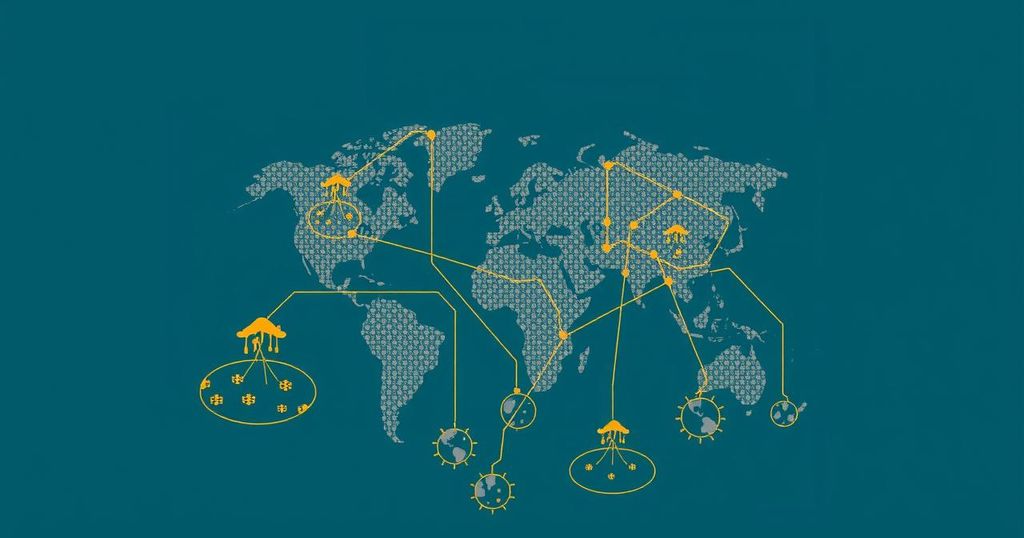The 2024 UN Climate Change Conference, COP29, took place in Baku, Azerbaijan, leading to a $300 billion agreement to support developing nations in handling climate issues. A significant focus was placed on the health impacts of climate change, with WHO highlighting that the climate crisis constitutes a health crisis. The conference built upon previous health initiatives, emphasizing the importance of merging health priorities into climate policy and action plans.
The 2024 UN Climate Change Conference, known as COP29, recently concluded in Baku, Azerbaijan, where delegates reached a significant $300 billion agreement aimed at assisting developing nations in confronting the climate crisis. The talks extended into overtime due to mounting tensions but reflected a crucial effort to formulate a comprehensive financial strategy to mitigate the escalating climate challenges.
Importantly, COP29 brought to the forefront the imperative intersection of climate change and public health. The conference was set against a backdrop of devastating climate-related disasters, including hurricanes and extreme heat events, which have severely impacted health outcomes globally. A record-breaking summer highlighted the growing risk of heat-related illnesses and the toll taken by severe flooding in regions such as Spain, which recently reported over 200 fatalities from extreme weather. A significant survey published in The Lancet Planetary Health revealed that nearly 43% of young Americans indicated experiencing mental health issues tied to climate change.
In this context, COP29 emphasized the integration of health perspectives into climate discussions. Dr. Tedros Adhanom Ghebreyesus, Director-General of the World Health Organization (WHO), articulated the necessity of climate action in safeguarding human health, stating that the climate crisis is inherently a health crisis. He noted, “We care about rising sea levels and temperatures because they take land and homes… and we care about air pollution because it fills our lungs with poison.”
This focus on health at COP29 built upon prior efforts from COP28, which introduced a dedicated “Health Day” to discuss climate and health intersections. This initiative led to the COP28 UAE Declaration on Climate and Health, a voluntary call for action recognizing the necessity of addressing health dimensions within climate strategies. At COP29, numerous events focused on topics such as gender equity in climate health and advancing climate literacy to construct sustainable healthcare systems were conducted, highlighting the ongoing commitment to this dual focus.
The WHO’s proactive involvement included the release of a comprehensive report detailing criteria for incorporating health into Nationally Determined Contributions (NDCs). This guidance is pivotal as countries revise their climate action plans by 2025, promising an essential alignment of health priorities with climate objectives. Additionally, the WHO updated its course on climate change negotiations, reinforcing the importance of health considerations in achieving climate resilience.
The dialogue initiated during COP29 is expected to set a strong foundation as attention shifts toward COP30 in Brazil next year, underscoring the urgent need to develop solutions that tackle the linked challenges of climate change and public health.
The UN Climate Change Conference (COP) serves as a critical platform for global discussions addressing climate challenges and solutions. In recent years, environmental shifts have brought forth significant health implications that necessitate urgent attention. As climate events increase in frequency and severity, they have become intertwined with public health outcomes, making it essential for WHO and other health organizations to advocate for the integration of health considerations into climate policies and actions. The participatory role of health stakeholders in these conferences is paramount to ensure a holistic approach to addressing climate change.
The COP29 conference underscored the urgent need for a unified approach that intertwines climate action with public health discourse. As the impacts of climate change become increasingly evident, integrating health priorities into climate strategies is not only necessary but critical for safeguarding populations worldwide. The groundwork laid at COP29 will undoubtedly influence future negotiations, reinforcing the significance of health in climate discussions and establishing a path forward for meaningful action.
Original Source: www.forbes.com






